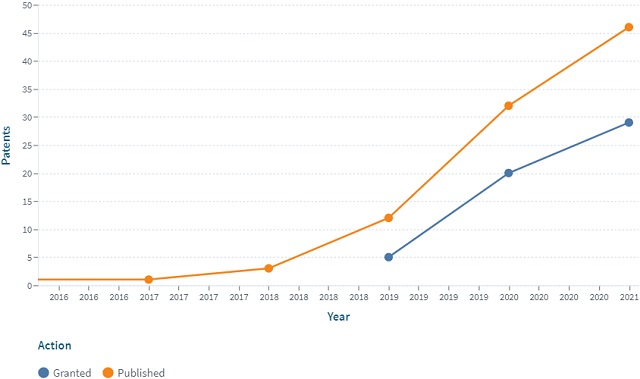- within Intellectual Property, Coronavirus (COVID-19) and Environment topic(s)
- in Asia
Blockchain has the potential to be the new frontier of innovation and a disruptor of existing technologies, and with this, has the potential for significant patent litigation. The technology now commonly known as "blockchain" was described by Stuart Haber and W. Scott Stornetta, and then used to describe the framework for bitcoin by a writer using the pen name Satoshi Nakamoto. The most talked-about use for blockchain has been for financial instruments, such as the aforementioned bitcoin as well as Ethereum and scores of non-fungible tokens, or NFTs. However, blockchain is being considered for numerous other areas, including energy trading, supply chain management, health care, e-commerce and life sciences.
Blockchain has been the subject of numerous patent applications over the past decade. As of the time of this writing, at least 5,7451 issued patents specifically address blockchain. The number of patents published and issued on the technology has been increasing:

https://www.lens.org/
The number of patents related to blockchain is significant, but the number of patents issued for many other technologies dwarfs that number. The number of issued blockchain patents is likely due in part to the lengthy time lag between when an application is filed and when a patent is issued (currently averaging 23.2 months). More patents are on their way, and the number issued is still increasing.
Blockchain has not been a significant source of patent litigation. However, one case currently in the courts is Rady v. Boston Consulting Group, LLC.2 There, Rady developed a method for identifying physical items, particularly gemstones, by their unique properties using 3D spatial mapping and spectral analysis and recording the result on a blockchain that acts to guarantee the authenticity of the physical item. A defendant moved to dismiss by asserting the patent are not patentable subject matter because it covers an abstract concept without any inventiveness. The current state of patentability law is a potential hurdle for blockchain litigation, and should the case proceed, it may provide an early indication of how claim construction and any validity challenges could play out for blockchain patents.
There is reason to believe more patent litigation related to blockchain is coming, but only time will tell how many more cases are filed. As more patents are issued, the chances that they will come into the hands of a party willing to assert them increase as well. Additionally, as companies dealing with this technology mature, they are making more revenue. This revenue will attract those wanting to extract value from their patents. This is certainly an area to keep an eye on for all those interested in patent litigation.
Footnotes
1 https://www.lens.org/ using the search terms "Blockchain" and "Distributed Ledger."
2 No. 1-20-cv-02285 (S.D.N.Y. Mar. 13, 2020).
The content of this article is intended to provide a general guide to the subject matter. Specialist advice should be sought about your specific circumstances.



